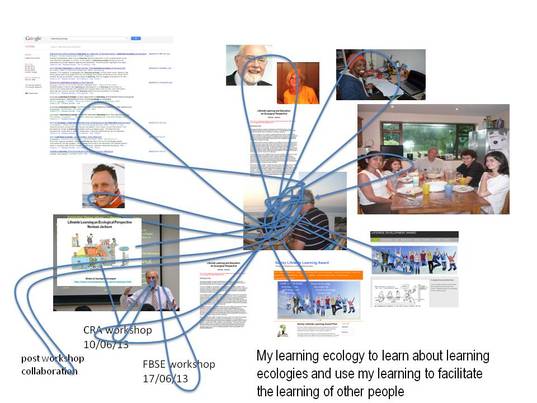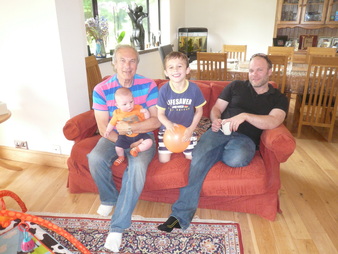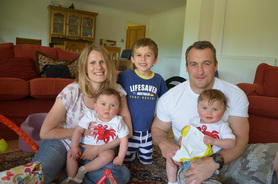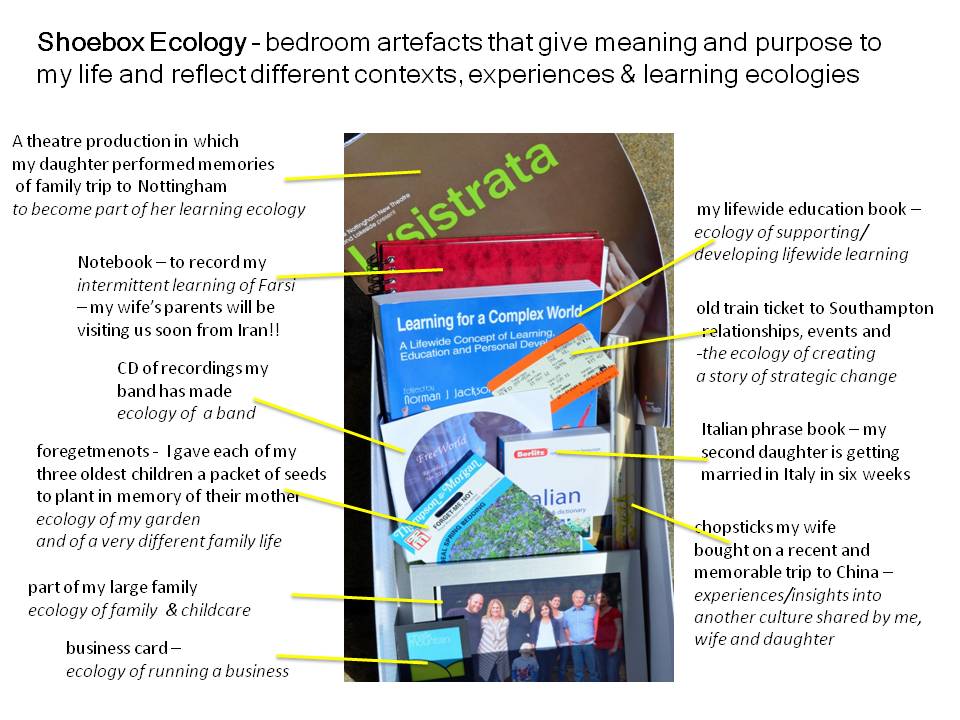|
It's been an emotionally draining week for our family as our son has been very poorly in hospital. It is not something I want to talk about in my blog. On Friday he heard that all his hard work at University has been rewarded with a first class degree.
1 Comment
On Monday I contributed to another workshop on the ecological theme at Southampton Solent University. My co-presenters had the idea of using a shoebox containing various items that might be used to stimulate the imaginations of participants to think about their own ecological stories of learning. I decided to create my own shoebox of artefacts.. I knew I had a shoebox in the bottom of my wardrobe and as I retrieved it I thought about Jay Lemkes words about investing meaning in the artefacts in our lives. I thought that here I was in a space that I occupied most days (nights) of the year and it must contain objects that I have invested with special symbolic significance or I could create particular meanings because of the memories they evoked. It was an enjoyable and enlightening exercise.. My bedside table and drawers are quite messy so I found a number of objects that held particular meaning and most I could see were associated with considerable learning and complex relationships and events within my world of family, work and travel. I photographed the images in my shoebox and made a slide for my presentation ... I thought it a good exercise to bring home the ways in which the objects in our life hold significant symbolic, relational or experiential meaning.
The shoebox ecology workshop ran by Christine Fountain and Susan Patrick worked from another direction. They filled two shoeboxes with objects and invited people to choose objects that they could associate with experiences and learning in their own lives.. two themes emerged ... gardening and occupying garden like spaces eg parks... and holidays.. and experiences people had had while travelling...or the effects of travel.... It was a wonderful example of the creative process of creating meaning from objects.... My son in law who is in the Blues and Royals regiment of the household cavalry managed to get me a ticket for Trooping the Colour an annual event at which the Queen presents the regimental colours (standard or flag) to the regiment. There is something about the immaculate uniforms, precision marching and riding combined with the music of military bands that strikes an emotional chord.... I felt privileged to witness the event and also to be invited to have lunch in the officers mess at the Knightsbridge barracks... Family's are good at creating opportunities for each other.
It's been an interesting week. On Monday I travelled to Birmingham to participate in the seminar organised by CRA on the theme of Recognising Lifewide Learning. I contributed a presentation and a workshop on the theme of an ecological perspective on lifewide learning. In fact I had used the opportunity of the seminar to make myself think about this idea and draw on the considerable body of existing work which is now contained in this evolving paper..  I introduced my talk with a slide that portrayed my own ecological process for making my contribution to the event. I had concluded that my learning process had been purposeful and directional - towards creating the resources and personal knowledge to be able to contribute to the seminar and workshop and that it had also involved lots of other people - the people who had codified their understandings in the articles I had read and whose ideas I had assimilated and reused, the people I had talked to especially members of my family, the people who had written blogs which I had drawn on, accounts of learning written by past students at Surrey and my daughter's evolving account of learning as she helps us pilot the lifewide development award. My learning had been both a constructive process and an organic social process. The workshop involved inviting participants to think of a learning project they had been involved in and to try in about fifteen minutes to record the key elements of their learning process. Each then told their story of learning and as a group we tried to think about the ecological aspects of the story. The process was quite revealing and on the train journey home (in true ecological spirit) I decided to email the people who had participated to invite them to continue working on the ideas that had emerged and to write them up as a co-authored paper to illustrate how such a workshop methodology can work in revealing the ecological process involved in lifewide learning. So far only two people have responded so I'm uncertain as to what will emerge from the process. But I feel sure that something useful will come from it. On Thursday I was thinking ahead to the next issue of Lifewide Magazine and thinking of potential contributors when I googled Jay Lemke - who has written extensively on ecosocial theory and who I had really enjoyed reading. I came across a beautifully written and inspiring chapter he wrote in 2002.. on becoming a village.. I cite a passage below to illustrate.. An old saying has it that it takes a village to raise a child. As children, we know how much we need to learn about everything and everyone in our communities to live there successfully. As we learn, we gradually become our villages: we internalize the diversity of viewpoints that collectively make sense of all that goes on in the community. At the same time, we develop values and identities: in small tasks and large projects, we discover the ways we like to work, the people we want to be, the accomplishments that make us proud. In all these activities we constantly need to make sense of the ideas and values of others, to integrate differing viewpoints and desires, different ways of talking and doing. As we participate in community life, we inevitably become in part the people that others need us to be, and many of us also find at least some of our efforts unsupported or even strenuously opposed by others... The challenges of living in a village define fundamental issues for both education and development.1 His website had a contact email address and in the spirit of nothing ventured nothing gained I decided to invite him to write a feature article for the next issue of the Magazine.. Within a few hours I had a very encouraging response which indicated that although in the midst of travelling from Europe to San Diego he had taken the trouble to follow the link I had given him to my website and had made a relational connection.. What a wonderful illustration of our ecologies in action. Fortified by insights gained at the CRA workshop, the other important decision I made this week was to reframe the conference we are planning for next year to focus attention on the way that universities are supporting lifewidelearning ie I turned it from a criticism of inaction to the opportunity to celebrate achievement and progress. In spite of uncertainties I went ahead and booked the venue thus committing Lifewide Education to the conference in March next year. Making these decisions brought a sense of relief, as so often decision making does, and I was much happier at the end of the week than I had been at the start. 1 Lemke J L (2002) Becoming the Village: Education across lives, in G. Wells and G. Claxton (eds) Learning for Life in the 21st Century: Sociocultural Perspectives on the Future of Education Blackwell Publishing Ltd, Oxford, UK available on-line at http://www.jaylemke.com/storage/becoming-the-village.pdf What binds one moment, one experience to another? We are accustomed to using the notion of memory' as our only answer to this question, but the idea of individual memory treats learning only from the viewpoint of the individual organism, and does not look at the activities in which we participate and all the people, places, and things around us that help make memory work (Jay Lemke) Perhaps also it is the meaning we give particular moments that makes memory work. I had been cutting grass and had soaked up the beauty all around me I just had to record something on this moment.  I am writing an essay on the ecology of learning for a seminar next week so the idea of ecologies has been very much in my mind. The basic ideas underlying the ecology of family(1) is that a family is a distinct closely related social group that interacts with their environment to form an ecosystem. Families carry out the following for the good of itself as well as the good of society: biological sustenance (have children and look after each other), economic maintenance (share resources), psychosocial nurturing (provide empathy and emotional support). Families and the environment are interdependent and they interact with multiple environments - typically each adult member inhabits a different physical/social environment. Adaptation is a continuing process in families. They can “respond, change, develop, and act on and modify their environment.” Interactions between families and environments are guided by two sets of rules: Physical and biological laws of nature and human-derived rules (e.g., social /cultural norms). Our physical environments do not determine our behavior but pose limitations and constraints as well as possibilities and opportunities. Decision making is the central control process that directs our actions for attaining individual and family goals. Families are underlain and held together through shared values including its survival: maintenance and sustainability are important features of life and the “four great virtues that contribute to the ‘ultimate good’”: economic adequacy, justice, freedom and peacefulness. Other virtues that contribute to the quality of family life include: health, education and learning, loving and nurturing relationships, productive work and work environments, experiences and symbolic systems that sustain meaning and a sense of community, beauty and trustworthiness. From an ecological perspective we might reflect on how our family functions and adapts to assure survival, how we collectively try to improve the quality of our lives, and how we contribute to sustaining natural resources. We might also consider how we allocate and manage resources over time to meet the changing needs of individuals and the family as a group. And how the environment (the meso-, exo-, and macrosystems of which we are apart impact on us. Scanning my blog I can see many references to our family and the ecology that sustains it and how the members of my immediate and the greater family impact on my life. For example, in my last blog I talked about my step nephew's search amongst family members for resources to enable him to finance some training to help him become a missionary both my wife and I have responded to him with financial and emotional help and he in return is coming to visit us in a couple of weeks. This week has also been half term so I had the pleasure of looking after my six year old grandson for 24 hours. I have been very conscious since the twins have been born that I have spent less time with him and this sleepover, and the things we did together, were an important way in which we renewed our bonds. As we parted he said (as he so often does) 'I love you ganddad', which gets right to the point of good family relationships. Last Tuesday I, and my wife helped my daughter with childcare looking after all three of her children so that she could go to work. I suppose this is an example of family ecology in action to help sustain the family and enable resources to be brought into the family. During the week my wife and I chatted at length to our two children at university listening to their problems (prep for exams and an important piece of coursework). They discussed their ideas for their future and we provided encouragement and practical suggestions where we could. Thanks to technology and mobile phones even when we are not physically together as a family we can remain in touch and have valuable conversations that sustain our family ecology. Making full use of our physical environment, yesterday my wife took me and our daughter out for a light and chilly (we sat outside) lunch and after cleaning the house and working in the garden (maintaining our physical environment) we had some fun and went to the cinema to see The Great Gatsby. This morning I was made to jump on the scales to see how much I weighed fortunately I hadn't had any breakfast. I then proceeded to set the scales to give me my BMI. She had been reading a book about fasting and she passed on the science she had learnt on to me. The experience of public weighing and telling me that I was nearly obese was also intended to convince me that I needed to do something about it - the family ecology of nurturing our health and educating me was clearly in evidence.  On Sunday we celebrated the twins first birthday with a small family gathering for two of my children and their families including all four of my grandchildren. I guess that birthdays are symbolic in families when we pay attention to the particular member of the family whose birthday it is and the celebrations and gifts are tokens of valuing them as members of our family. And as I complete this piece my daughter who is over from Dubai for a few days is staying with us. Last night we spent time catching up and talking a lot about a particular matter involving another member of the family. I was struck by her deep concern and her willingness to provide both practical help and emotional support. These simple stories of family life in the past week reflect the everyday functionings of our family. A family I am very proud of. Each example illustrates the ecology that binds us together and gives us an important part of our identity and our sense of individual and social wellbeing. But these sorts of ecologies are learned. The values, attitudes and behaviours that underpin such ecologies are passed on from generation to generation propagated by parents who teach their children the importance of these things. I know that I and both of my wives learnt the meanings of family from growing up in our respective families and we have simply tried to practice the values and practices that were passed on to us through these lived experiences. I can no see the same patterns emerging as my children and step children find their own independent way in the world. 1) I found this powerpoint presentation which provided the core ideas for the ecology of family www.public.iastate.edu/~hd_fs.511/lecture/Sourcebook17.ppt Bubolz, M. M., & Sontag, M. S. (1993). Human ecology theory. In P. G. Boss, W. J. Doherty, R. LaRossa, W. R. Schumm, & S. K. Steinmetz (Eds.), Sourcebook of family theories and methods: A contextual approach (pp. 419-448). New York: Plenum Press. |
PurposeTo develop my understandings of how I learn and develop through all parts of my life by recording and reflecting on my own life as it happens. I have a rough plan but most of what I do emerges from the circumstances of my life
Archive
January 2021
Categories
|





 RSS Feed
RSS Feed